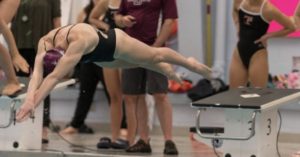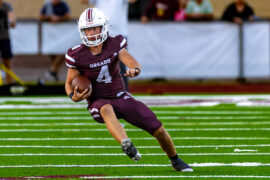The COVID-19 crisis has forced a lockdown of high school campuses all over the state – including Ann Arbor and Dexter – and all over the country. Sports, on the other hand, have been more open for discussion and debate, and in many parts of the country – including Michigan – are on the field and competing.
The fall 2020 football season was reinstated last week by the Representative Council of the Michigan High School Athletic Association after Governor Gretchen Whitmer’s Executive Order 176 lifted restrictions that previously did not allow the sport to be played.
The MHSAA also gave the green light for an immediate start of competition for boys soccer; girls swimming & diving and girls volleyball. Other sports, including tennis and cross country, had already begun competition.
One thing is certain about the decision to play fall sports, there clearly isn’t a simple decision.
Ann Arbor School Supt. Dr. Jeanice Kerr Swift stated last week in a letter to parents: “We are balancing many competing, critical factors in weighing this challenging decision, and we recognize that there is no decision that will satisfy all; in fact, there are no easy decisions during COVID-19.”
The National Federation of State High School Associations (NFHS) is tracking the status of high school sports around the country. Because of the pandemic, several states have delayed the start of the fall sports season or have altered the sports seasons altogether including moving some sports to the spring.
Others, have taken the field with strict health guidelines in place.
As of Sept. 11, only seven states and the District of Columbia have cancelled fall competitions while 29 have modified HS athletics. Fourteen states, including Indiana, have kicked off the season with no changes.
 Football (chart above) is a different story.
Football (chart above) is a different story.
As many as 20 states have decided to punt on the season because of the higher risk associated with contact sports. New York, Illinois Minnesota, Virginia and California are among those sitting out the football season in the fall.
And 17 states, including Michigan, Ohio and Wisconsin, have modified the season. Michigan has pushed back the kickoff date for the season to Sept. 18 – Ann Arbor has pushed that back a week to Sept. 25.
There also seems to be a bigger concern with indoor sports – something that will have to be addressed again in a few months when the winter sports season rolls around. Volleyball, for example, has been cancelled in 18 states, including Illinois and Minnesota.
MHSAA guidelines on face coverings
New Jersey is one state, for example, that is playing football but has postponed indoor sports such as volleyball and gymnastics.
Last week, the New York State Public High School Athletic Association decided to move football from the fall to March 1 because of coronavirus concerns. Volleyball and cheerleading, which are also considered high-risk activities, will be pushed to the spring as well. Lower risk sports, such as tennis, golf, swimming, field hockey, cross country and soccer, remain on schedule for the start of practice Sept. 21.
“We’ve spent two days speaking with nearly 500 athletic directors across the state and it’s clear that administering high-risk fall sports during the COVID-19 pandemic presents a significant challenge for our member schools,” Dr. Robert Zayas, executive director of the NYSPHSAA said in a statement. “These are unprecedented times and unfortunately, difficult decisions will have to be made to address this ongoing crisis. We continue to stay committed to providing support to our member schools and quality participation experiences for the students we serve.”
Some teams and athletes are making their own decisions.
In California, the Orange-County Register recently published a story on how area baseball programs were heading out of state to play games after California pulled the plug on all fall sports.
Troy dela Vega, a 6-foot-5, 240-pound tight end and defensive lineman from Walnut Creek (Calif.), packed his bags and headed to Utah so he could play his senior year of football and hopefully create opportunities to play college football.
Utah is one of just a handful of states in the western U.S. that has not put high school football on pause during the coronavirus pandemic.
“I was one of those bubble kids that needed senior film,” dela Vega told the San Jose Mercury News.
Utah was one of the first states to play football games during the COVID-19 pandemic. And after a somewhat rough start – several games had to be cancelled (South Jordan Bingham and Pleasant View Weber after three Bingham players tested positive for COVID-19) – nearly 50 other games were played in that first weekend.









